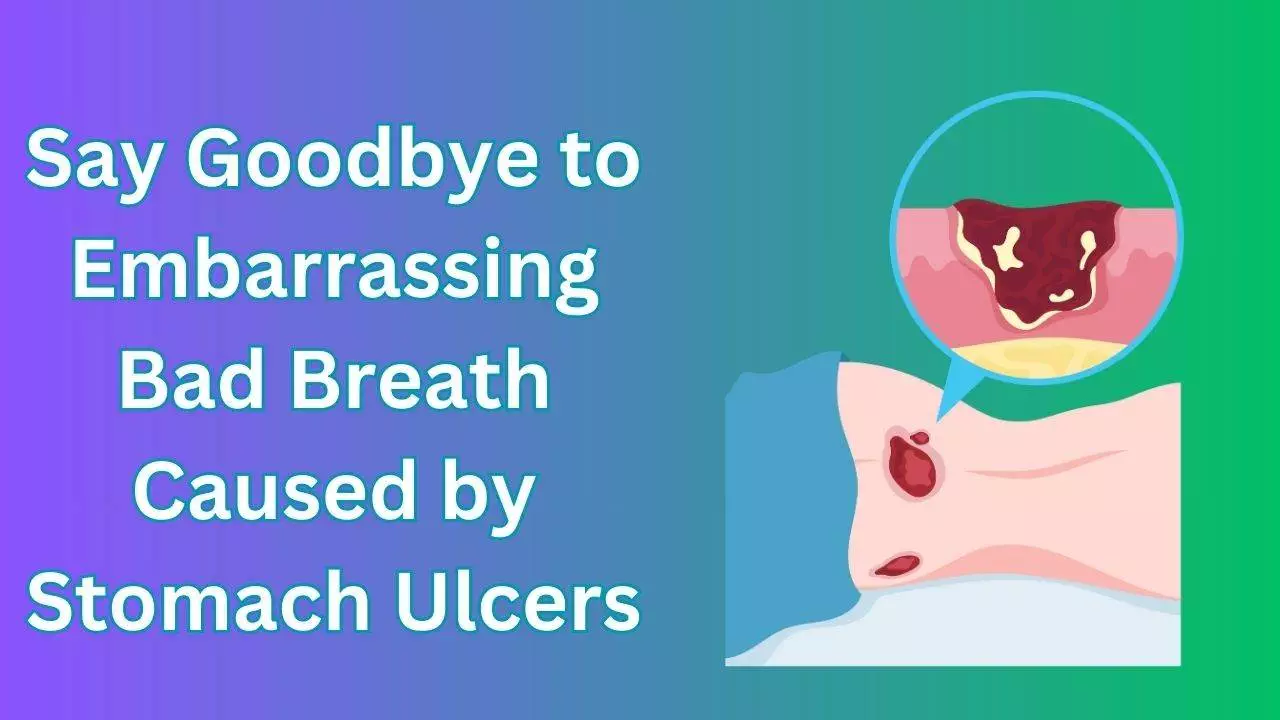
- Understanding Stomach Ulcers
- How Stomach Ulcers Contribute to Bad Breath
- The Role of H. Pylori Bacteria
- Symptoms of Stomach Ulcers and Bad Breath
- Diagnosis and Treatment Options
- Lifestyle Changes to Prevent Stomach Ulcers and Bad Breath
- Foods to Eat and Avoid
- Dental Hygiene Tips
- Maintaining Oral Health While Managing Stomach Ulcers
- Importance of Seeking Medical Attention
Stomach ulcers and bad breath are two common health issues that many people may not realize are connected. Bad breath, also known as halitosis, can be embarrassing and affect a person’s self-confidence. Stomach ulcers, on the other hand, are painful sores that develop in the lining of the stomach or small intestine. Understanding the link between stomach ulcers and bad breath is important for proper diagnosis and treatment of both conditions.
Understanding Stomach Ulcers
Stomach ulcers, also known as peptic ulcers, are open sores that develop in the lining of the stomach or small intestine. They are usually caused by an imbalance between the stomach acid and the protective lining of the digestive system. Common causes of stomach ulcers include infection with Helicobacter pylori (H. pylori) bacteria, long-term use of nonsteroidal anti-inflammatory drugs (NSAIDs), such as aspirin or ibuprofen, and excessive alcohol consumption.
Risk factors for developing stomach ulcers include smoking, stress, a family history of ulcers, and certain medical conditions such as liver disease or chronic obstructive pulmonary disease (COPD). Symptoms of stomach ulcers can vary but may include abdominal pain or discomfort, bloating, heartburn, nausea, and vomiting. In severe cases, complications such as bleeding or perforation of the stomach lining may occur.
How Stomach Ulcers Contribute to Bad Breath
The connection between stomach ulcers and bad breath lies in the way stomach acid and bacteria interact in the digestive system. Stomach acid plays a crucial role in breaking down food and killing harmful bacteria in the stomach. However, when there is an overproduction of stomach acid or a breakdown in the protective lining of the digestive system, stomach acid can irritate the stomach lining and create an environment for bacteria to thrive.
The bacteria that can contribute to bad breath are often present in the mouth and digestive system. When stomach acid irritates the stomach lining, it can lead to an increase in the production of these bacteria. As a result, the bacteria release sulfur compounds that have a foul odor, leading to bad breath. Additionally, the presence of stomach ulcers can cause a decrease in saliva production, which can further contribute to bad breath as saliva helps to wash away bacteria and food particles in the mouth.
The Role of H. Pylori Bacteria
H. pylori bacteria are a common cause of stomach ulcers and can also contribute to bad breath. These bacteria are usually acquired during childhood and can live in the digestive system for many years without causing any symptoms. However, in some cases, H. pylori bacteria can cause inflammation and damage to the stomach lining, leading to the development of ulcers.
Diagnosing H. pylori infection involves a combination of tests, including blood tests, breath tests, stool tests, and endoscopy. Treatment for H. pylori infection usually involves a combination of antibiotics and acid-suppressing medications to eradicate the bacteria and promote healing of the ulcers. It is important to note that not all stomach ulcers are caused by H. pylori infection, so proper diagnosis is essential for effective treatment.
Symptoms of Stomach Ulcers and Bad Breath
Common symptoms of stomach ulcers include abdominal pain or discomfort, which may be described as a burning or gnawing sensation, bloating, heartburn, nausea, vomiting, and unintentional weight loss. These symptoms may come and go or persist for weeks or months.
Bad breath caused by stomach ulcers may have a distinct odor that is different from typical bad breath caused by poor oral hygiene or certain foods. The smell is often described as sour or metallic and may be accompanied by a sour taste in the mouth. It is important to differentiate between bad breath caused by stomach ulcers and other causes of bad breath, such as poor oral hygiene or certain foods, as the underlying condition needs to be addressed for effective treatment.
Diagnosis and Treatment Options
Diagnosing stomach ulcers and bad breath requires a thorough evaluation by a healthcare professional. For stomach ulcers, diagnostic tests may include an upper endoscopy, which involves inserting a flexible tube with a camera into the digestive tract to visualize the ulcers. Other tests may include blood tests to check for H. pylori infection, stool tests to detect the presence of blood, and imaging tests such as X-rays or CT scans.
Treatment options for stomach ulcers may include medications to reduce stomach acid production, antibiotics to eradicate H. pylori infection, and medications to protect the lining of the stomach and promote healing of the ulcers. Lifestyle changes such as avoiding NSAIDs, reducing stress, quitting smoking, and limiting alcohol consumption may also be recommended.
For bad breath caused by stomach ulcers, treatment involves addressing the underlying cause of the ulcers. This may include taking medications to reduce stomach acid production and eradicate H. pylori infection. Additionally, maintaining good oral hygiene practices such as brushing and flossing regularly, using mouthwash, and staying hydrated can help alleviate bad breath symptoms.
Lifestyle Changes to Prevent Stomach Ulcers and Bad Breath
Preventing stomach ulcers and bad breath involves making certain lifestyle changes. These changes can help reduce the risk of developing ulcers and minimize symptoms of bad breath. Some tips for preventing stomach ulcers include:
1. Avoiding NSAIDs: Nonsteroidal anti-inflammatory drugs (NSAIDs) can irritate the stomach lining and increase the risk of developing ulcers. If you need pain relief, consider using alternative medications or consult with your healthcare provider for safer options.
2. Managing stress: Chronic stress can increase the production of stomach acid and contribute to the development of ulcers. Finding healthy ways to manage stress, such as exercise, meditation, or therapy, can help reduce the risk of ulcers.
3. Quitting smoking: Smoking can weaken the protective lining of the stomach and increase the risk of developing ulcers. Quitting smoking is not only beneficial for overall health but also helps prevent stomach ulcers.
4. Limiting alcohol consumption: Excessive alcohol consumption can irritate the stomach lining and increase the risk of developing ulcers. Moderation is key when it comes to alcohol consumption to maintain a healthy digestive system.
Foods to Eat and Avoid
Diet plays a crucial role in maintaining good oral and digestive health. Certain foods can promote the growth of bacteria in the mouth and contribute to bad breath, while others can help soothe the stomach lining and promote healing of ulcers. Some foods to eat for better oral and digestive health include:
1. Fiber-rich foods: Foods high in fiber, such as fruits, vegetables, whole grains, and legumes, can help promote regular bowel movements and prevent constipation, which can contribute to bad breath.
2. Probiotic-rich foods: Probiotics are beneficial bacteria that can help maintain a healthy balance of bacteria in the digestive system. Foods such as yogurt, kefir, sauerkraut, and kimchi are rich in probiotics.
3. Lean proteins: Lean proteins such as chicken, fish, tofu, and beans are easier to digest and less likely to irritate the stomach lining.
On the other hand, there are certain foods that should be avoided to prevent stomach ulcers and bad breath:
1. Spicy foods: Spicy foods can irritate the stomach lining and increase acid production, leading to symptoms of ulcers and bad breath.
2. Acidic foods: Foods high in acidity, such as citrus fruits, tomatoes, and vinegar, can worsen symptoms of ulcers and contribute to bad breath.
3. Sugary foods and drinks: Consuming excessive amounts of sugar can promote the growth of bacteria in the mouth and contribute to bad breath. It can also worsen symptoms of ulcers by increasing inflammation in the digestive system.
Dental Hygiene Tips
Maintaining good oral hygiene is essential for combating bad breath caused by stomach ulcers. Some tips for maintaining good oral hygiene include:
1. Brushing twice a day: Brushing your teeth at least twice a day with fluoride toothpaste helps remove plaque and bacteria that can contribute to bad breath.
2. Flossing daily: Flossing helps remove food particles and bacteria from between the teeth and along the gumline, where a toothbrush cannot reach.
3. Using mouthwash: Using an antimicrobial mouthwash can help kill bacteria in the mouth and freshen breath. Look for mouthwashes that contain ingredients such as chlorhexidine or cetylpyridinium chloride.
4. Cleaning your tongue: Bacteria can accumulate on the surface of the tongue, leading to bad breath. Use a tongue scraper or brush to clean your tongue regularly.
Maintaining Oral Health While Managing Stomach Ulcers
Managing stomach ulcers can be challenging, but it is important to maintain good oral health during this time. Some tips for maintaining oral health while managing stomach ulcers include:
1. Rinse your mouth after vomiting: If you experience vomiting as a symptom of stomach ulcers, rinse your mouth with water or a mouthwash to help remove stomach acid and prevent damage to the teeth.
2. Stay hydrated: Drinking plenty of water helps maintain saliva production, which can help wash away bacteria and food particles in the mouth.
3. Avoid brushing immediately after vomiting: Stomach acid can weaken the enamel on your teeth, so it is best to wait at least 30 minutes after vomiting before brushing your teeth to avoid further damage.
4. Communicate with your healthcare providers: Inform your healthcare providers about any oral health issues you may be experiencing so they can provide appropriate guidance and treatment.
Importance of Seeking Medical Attention
Chronic bad breath and stomach issues should not be ignored, as they can be signs of underlying health problems. Seeking medical attention is important for early detection and treatment of conditions such as stomach ulcers and H. pylori infection. Early intervention can prevent complications and improve overall health and well-being.
If you are experiencing chronic bad breath or symptoms of stomach ulcers, it is important to consult with a healthcare professional for proper diagnosis and treatment. They can perform the necessary tests to determine the underlying cause of your symptoms and recommend appropriate treatment options.
In conclusion, understanding the link between stomach ulcers and bad breath is crucial for proper diagnosis and treatment of both conditions. Stomach ulcers can contribute to bad breath through the interaction between stomach acid and bacteria in the digestive system. H. pylori bacteria play a significant role in the development of stomach ulcers and can also contribute to bad breath.
Diagnosing and treating stomach ulcers and bad breath involves a combination of lifestyle changes, medications, and good oral hygiene practices. Preventing stomach ulcers and bad breath through lifestyle changes such as avoiding NSAIDs, managing stress, quitting smoking, and limiting alcohol consumption is essential for maintaining good oral and digestive health.
Maintaining good oral hygiene practices, such as brushing and flossing regularly, using mouthwash, cleaning the tongue, and staying hydrated, can help combat bad breath caused by stomach ulcers. Seeking medical attention for chronic bad breath or symptoms of stomach ulcers is important for early detection and treatment to prevent complications and improve overall health and well-being.









